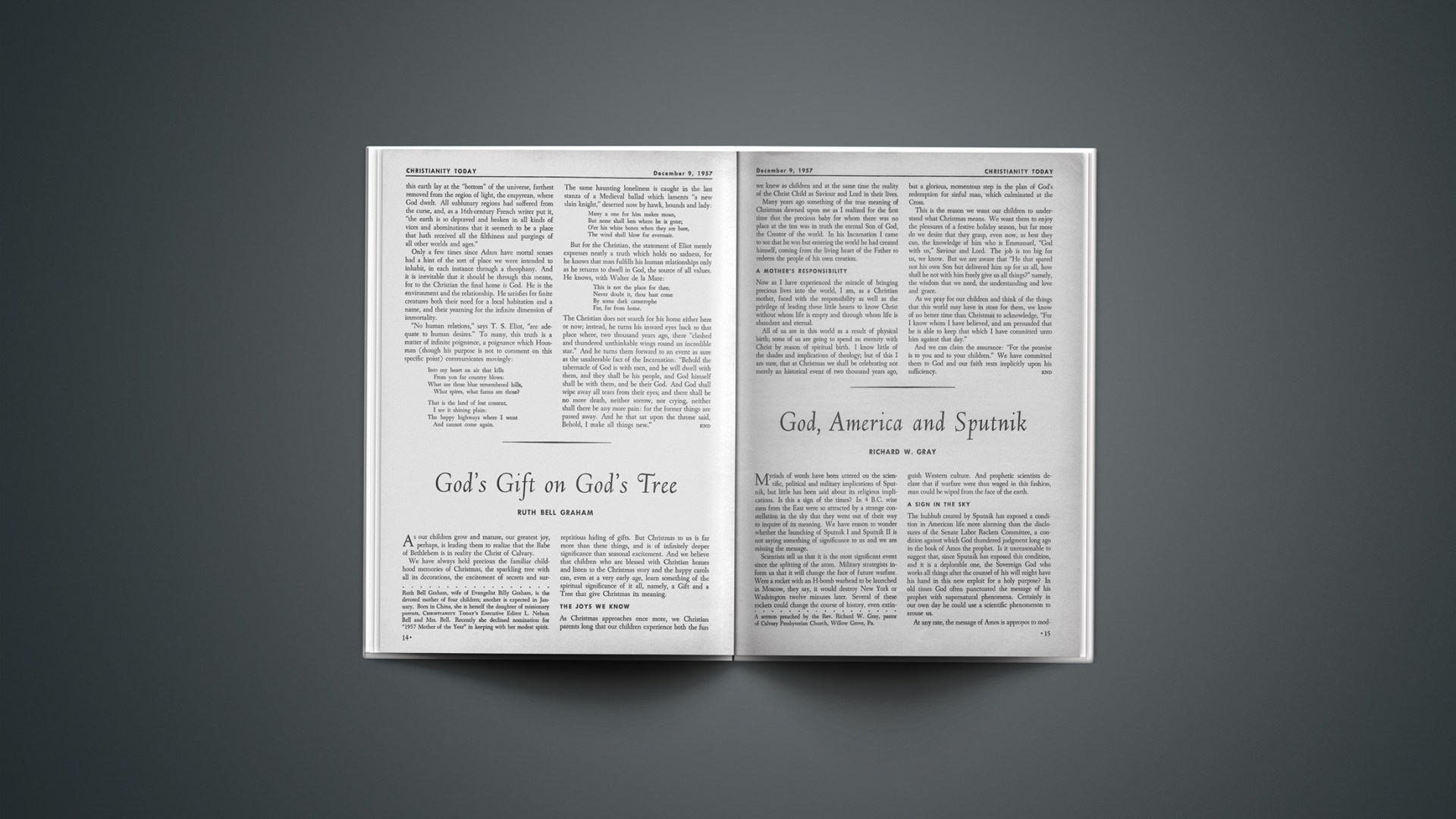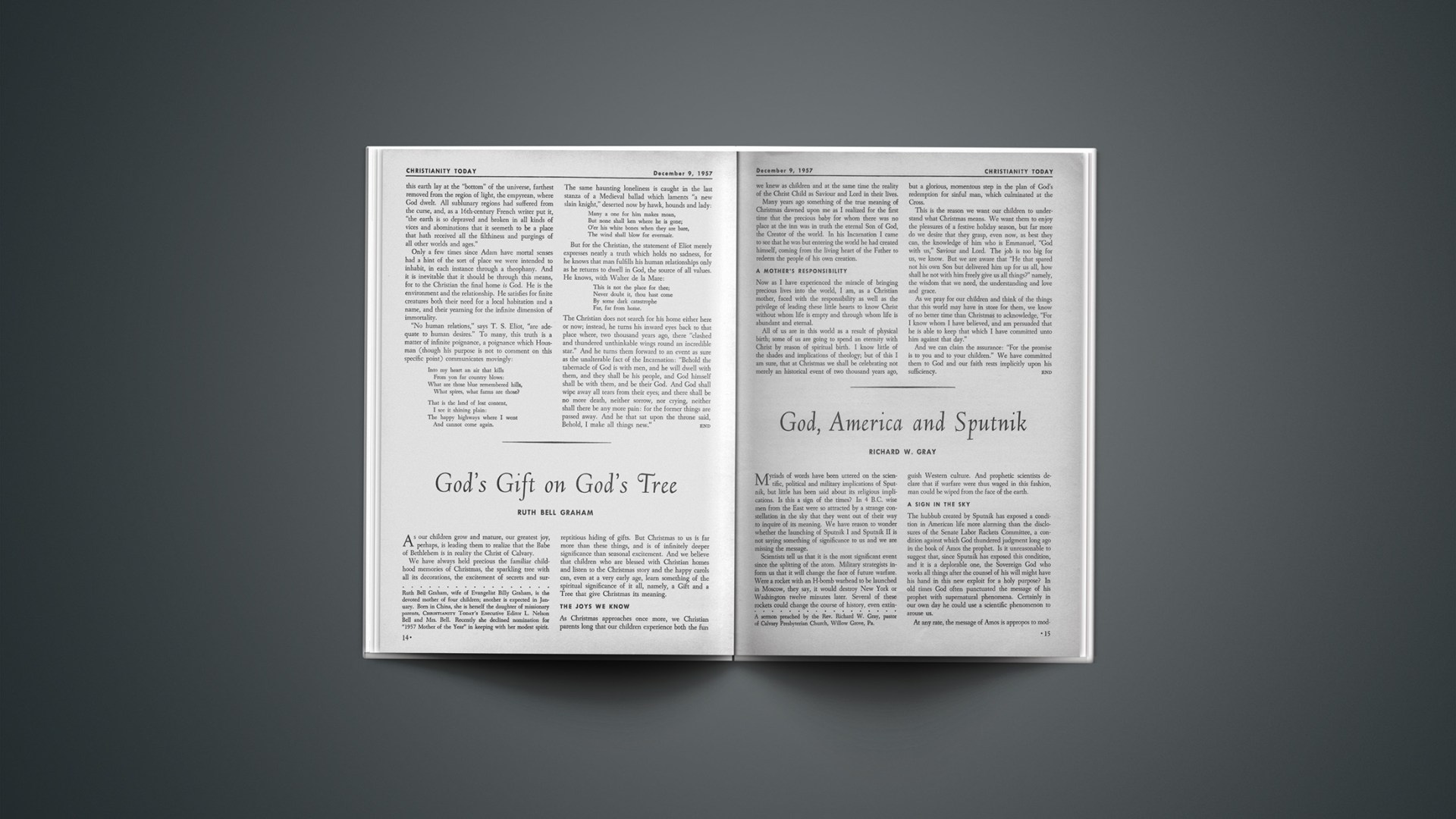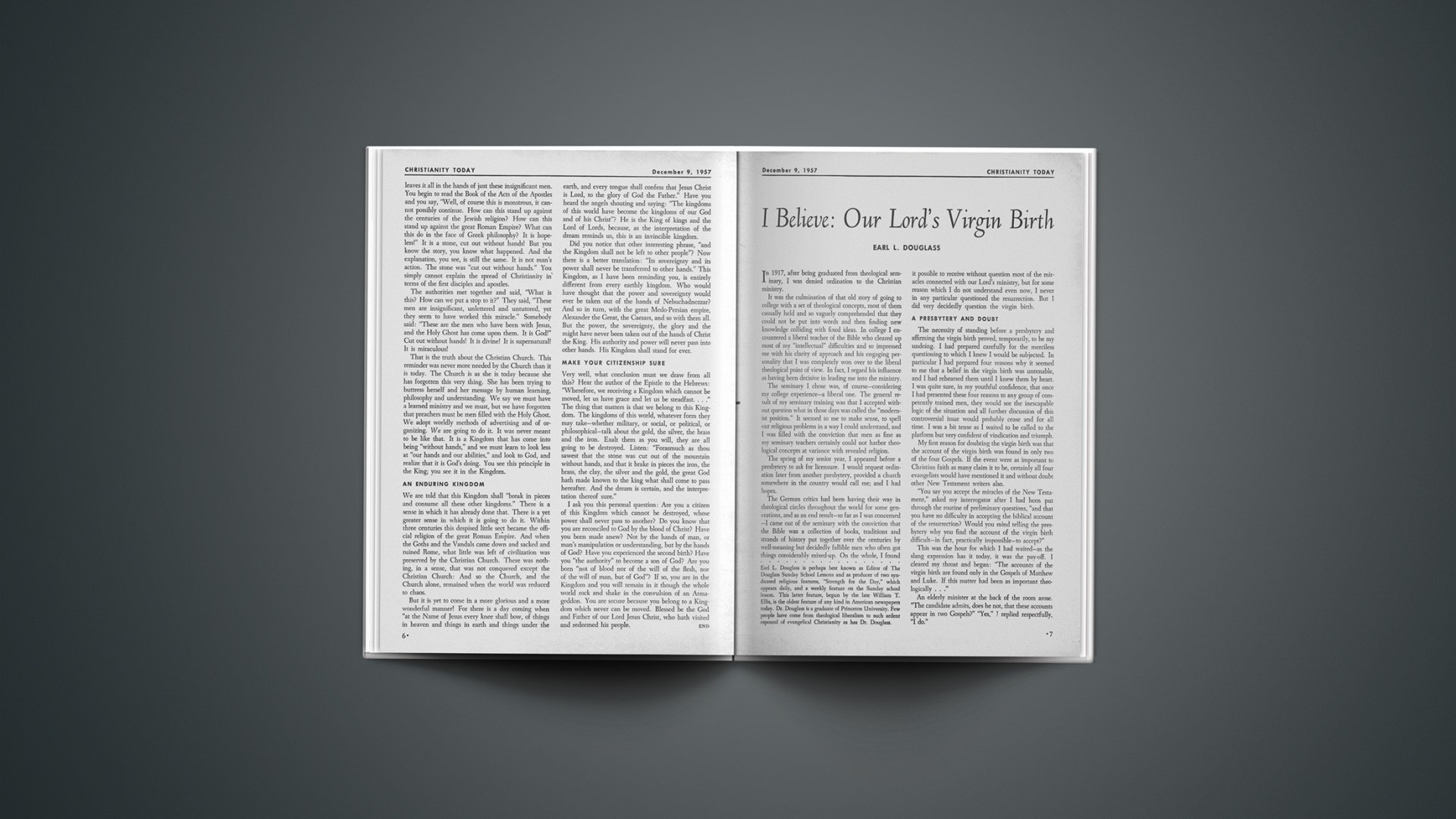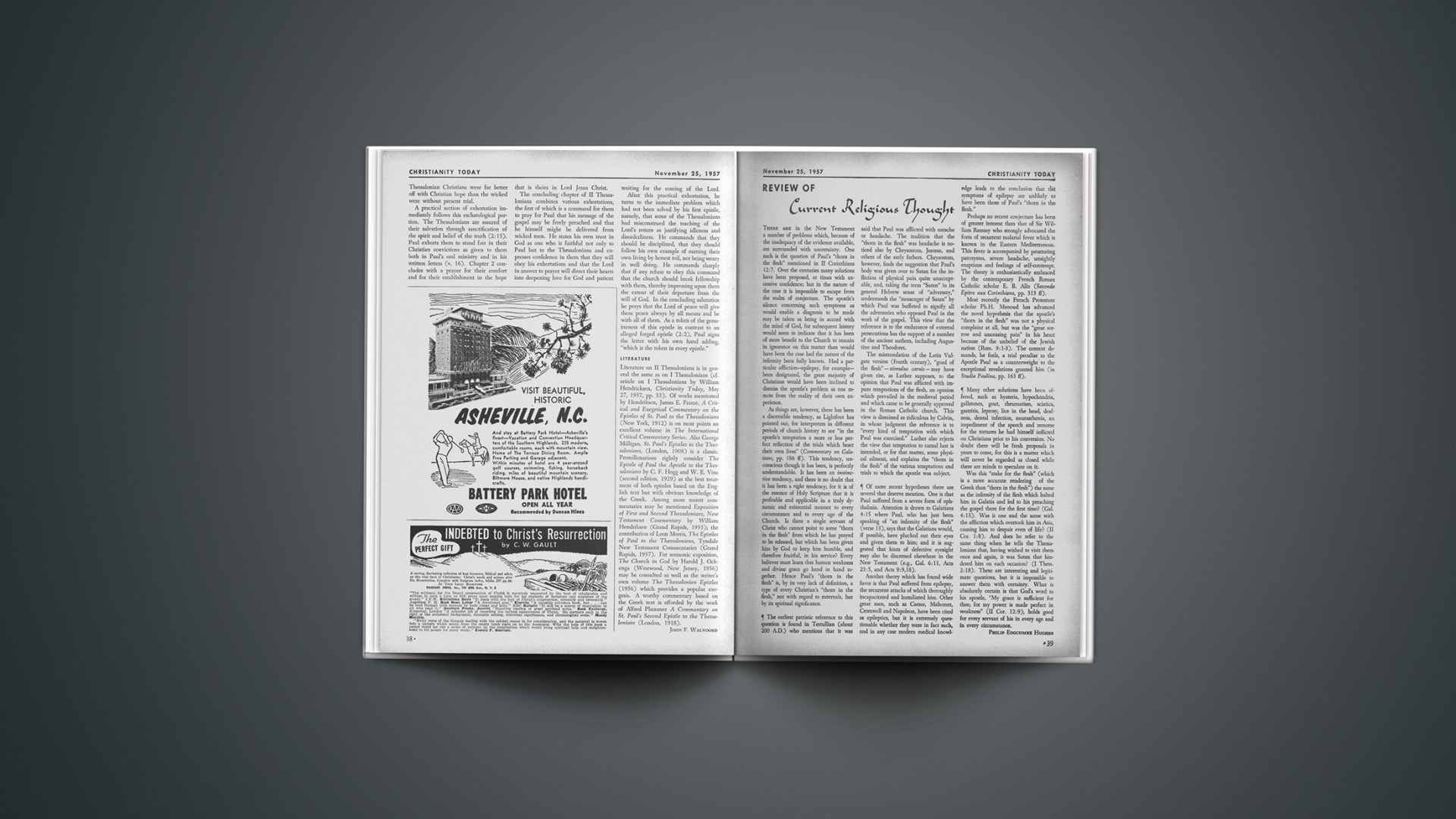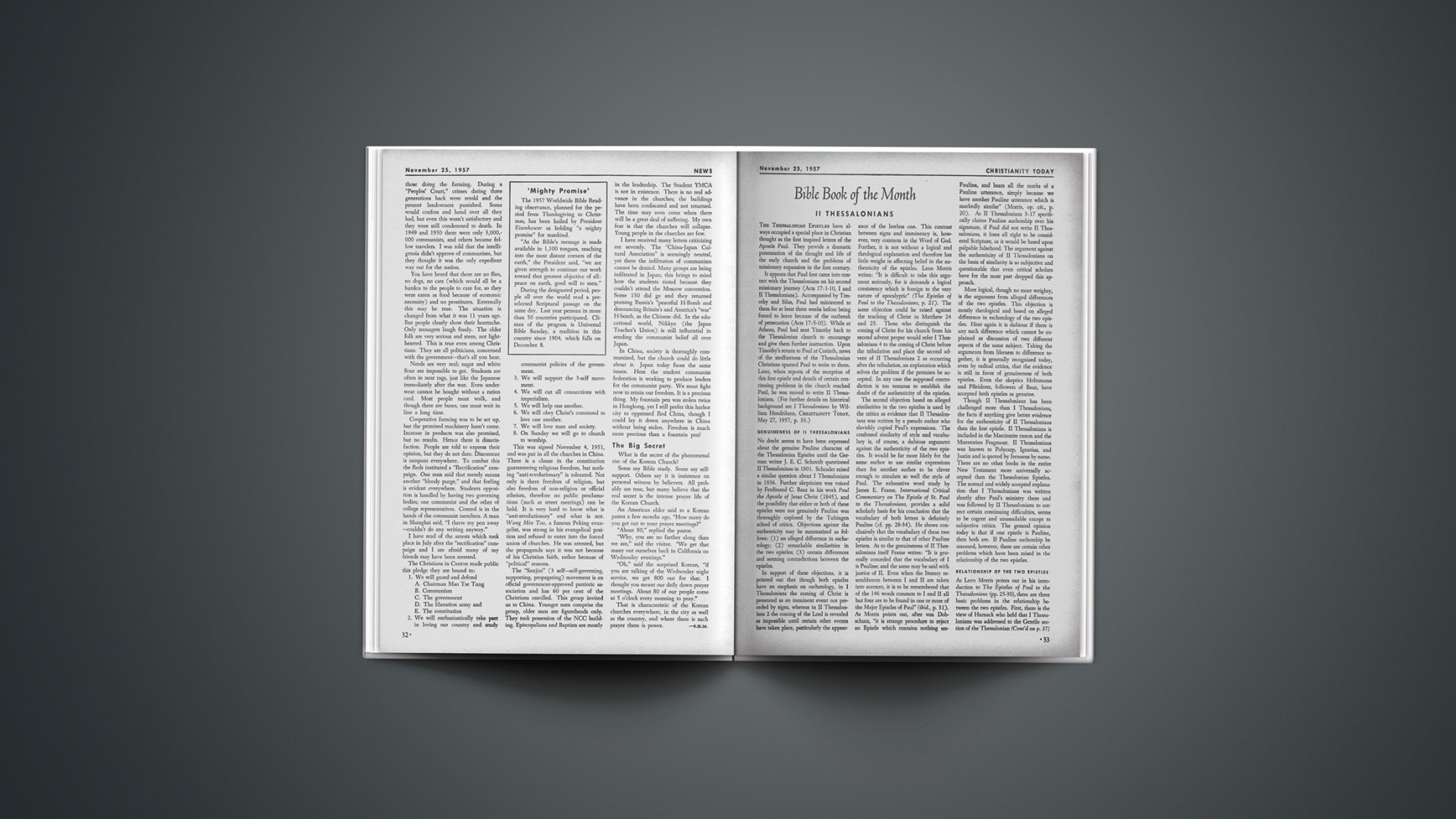Myriads of words have been uttered on the scientific, political and military implications of Sputnik, but little has been said about its religious implications. Is this a sign of the times? In 4 B.C. wise men from the East were so attracted by a strange constellation in the sky that they went out of their way to inquire of its meaning. We have reason to wonder whether the launching of Sputnik I and Sputnik II is not saying something of significance to us and we are missing the message.
Scientists tell us that it is the most significant event since the splitting of the atom. Military strategists inform us that it will change the face of future warfare. Were a rocket with an H-bomb warhead to be launched in Moscow, they say, it would destroy New York or Washington twelve minutes later. Several of these rockets could change the course of history, even extinguish Western culture. And prophetic scientists declare that if warfare were thus waged in this fashion, man could be wiped from the face of the earth.
A Sign In The Sky
The hubbub created by Sputnik has exposed a condition in American life more alarming than the disclosures of the Senate Labor Rackets Committee, a condition against which God thundered judgment long ago in the book of Amos the prophet. Is it unreasonable to suggest that, since Sputnik has exposed this condition, and it is a deplorable one, the Sovereign God who works all things after the counsel of his will might have his hand in this new exploit for a holy purpose? In old times God often punctuated the message of his prophet with supernatural phenomena. Certainly in our own day he could use a scientific phenomenon to arouse us.
At any rate, the message of Amos is appropos to modern America, Sputnik or no Sputnik. The words of the prophet are couched in language more vitriolic than that of the politicians now condemning our government’s preparedness program. God is directing his message against both the leaders and followers of the nation.
Wake Up To Judgment
The first thing that Amos 6:1–8 makes obvious is, God wants America to wake up and stop ignoring his threat of future judgment. “Woe to them that are at ease in Zion, and feel secure in the mountain of Samaria … O you who put far away the evil day, and bring near the seat of violence” (6:1, 3).
Like those in ancient Zion, Americans are at ease. We trust in our military defenses as much as the Israelites trusted in their natural mountain fortresses. And by concentrating on our strength, we do not even think of God as essential to our defense.
Those who recall V-E Day in 1945 will remember the sense of dependence upon God which the people manifested the moment Germany’s surrender was announced. They went to church—thanksgiving to God for the gracious victory he had given was the order of the day. And had the same spirit prevailed on Sputnik Day, we Americans would again have turned to God in prayer. But instead, we scoffed at the Russian achievement, and we boasted that we were more powerful, Sputnik to the contrary. Our attitude showed that as far as we were concerned, the evil day, the day of reckoning, was far in the future. In reality, however, Sputnik has probably really brought us nearer to that day which Amos called a day of violence.
The same kind of warning which the prophet gives was uttered by Dr. Vannevar Bush, retired head of the Office of Scientific Research during World War II. “If it wakes us up,” said Dr. Bush, “I’m glad the Russians did it. We are altogether too smug in this country.”
Self-sufficient smugness is not an appropriate posture for a creature in this marvelous world of God’s. If the wonders of nature as seen by the naked eye caused the Psalmist to utter the poetry of the 8th Psalm, can God expect anything less from the American with a telescope in one hand and a microscope in the other? “The heavens declare the glory of God; and the firmament showeth his handywork” (Ps. 19:1). The response God expects is the humble reverence of these words: “What is man, that thou art mindful of him: and the son of man, that thou visitest him?” (Ps. 8:4).
Instead of a posture of prayer before the God who wrought these wonders, we hear a paean of praise to the men who are God’s beneficiaries. America’s complacency in its “business as usual” attitude is aptly described by Jesus in a sermon preached shortly before his death. It is a sermon which strikes a prophetic note, an overtone of the Day of Judgment. “But as the days of Noah were, so shall also the coming of the Son of man be. For as in the days that were before the flood they were eating and drinking, marrying and giving in marriage, until the day that Noah entered into the ark, and knew not until the flood came, and took them all away; so shall also the coming of the Son of man be” (Matt. 24:37–39).
America’s defense lies not in its armies nor its atoms, necessary as these are but in a simple trust in the Living God. If we continue to ignore him, judgment will come. Sputnik is not the judgment but Sputnik ought to awaken us to the possibility that our country could become a holocaust. We need the admonition: “Prepare to meet thy God, O America.”
Misplaced Trust
A second look at the message of God through Amos suggests that in our time God is chiding America for trust in her might rather than in his power. Thunders the prophet:
I abhor the pride of Jacob (America),
and hate his strongholds (Amos 6:8).
We take great pride in our technological prowess, our scientific acumen, our economic strength, our atomic weapons—the kind of pride that has made us lose our sense of dependence on God. We have been arrogant, and have displeased our Creator. We have forgotten that we are not a self-made people. Nor have we any business worshipping ourselves.
When questioned about Sputnik, the Secretary of Defense laughed, “It is a neat scientific trick that all the world is intrigued over.” That was on the day after the launching. A week later, a high government official departed from a prepared speech on food to scoff at what he called “the Russian ‘bauble.’ ” Now, a month later, with half-ton Sputnik II orbitting in the heavens (America’s twenty-three pound satellite is not even able to get off the earth) someone else is laughing—someone in addition to the Russians. The second Psalm speaks prophetically of situations like this: “He that sitteth in the heavens shall laugh: the Lord shall have them in derision. Then shall he speak unto them in his wrath, and vex them in his sore displeasure.” God laughs at our pride.
A reporter from U. S. News and World Report hurried to Barcelona after the launching of Sputnik. The International Astronautical Congress was in session there, and he wanted to ask the scientists why the United States had fallen behind in launching a satellite. This is what they told him: (1) Our policy-makers underestimated Russia’s technological skill and were over-confident on America’s skill. (2) The United States understimated the military, scientific and propaganda importance of satellites and as a result gave our satellite program a low priority rating. (3) Our government permitted Vanguard, the embyronic American Sputnik, to be ballyhooed, thus challenging the Russians to puncture America’s superiority complex.
This Maginot Line temperament—all is well behind the mighty defenses we have built—may prove our downfall. Not because we shall fail to catch up with Russia, but because we shall not catch wise to ourselves. We are repeating Napoleon’s mistake by thinking God to be on the side of the mightiest battalions.
God thunders to us as he thundered to ancient Israel: “I abhor America’s pride, and hate her strongholds.”
A Divine Rebuke
A final look at the Word of God through Amos discloses that God is rebuking America for allowing her prosperity to soften her and lead her from God.
Woe to them that lie on beds of ivory,
And stretch themselves upon their couches,
And eat lambs from the flock,
And calves from the midst of the stall;
Who sing idle songs to the sound of the harp,
And like David invent for themselves instruments of music;
Who drink wine in bowls,
And anoint themselves with the finest oils,
But are not grieved over the ruin of Joseph!
Therefore they shall now be the first of those to go into exile,
And the revelry of those who stretch themselves shall pass away (Amos 6:4–7).
Amos was writing after the Golden Age of Solomon, during the most prosperous period in Israel’s history. Israel’s borders had been extended by military victory. Her wealth had been increased by profitable commerce. She was better off than the nations about her. Yet in all this prosperity men languished upon beds of ivory (the most expensive kind). There was no expression of praise to God but only songs of revelry and drinking, only excessive pleasures, making them insensitive to the sin which had before proved the ruin of Joseph. And as a result of their conviviality, God promised them a judgment of exile.
Is the parallel of this to modern America difficult to see? We are the most prosperous nation in the world. The standard of living for the average American eclipses that of kings only a few centuries ago.
Do we thank the God who has so blessed us? No! Rather we consume more liquor than any nation in history; we have a higher divorce rate than any country of modern time; we spend more money on pleasure than any people before us—sin, clamor and licentiousness try hard to drown the small voice of thanksgiving which those few who are devout seek to make heard.
Sputnik has uncovered our condition. And Senator Styles Bridges has declared: “The time has clearly come to be less concerned about the depth of the pile on the new broadloom rug or the height of the fin on the new car and be prepared to shed blood, sweat and tears.”
Is anyone to deny that a drive for the cutting of taxes has retarded our missile and satellite program? Why should we want our taxes cut? In order to spend more money on ourselves and live to the hilt in this pleasuremad day. As Harry Stine, a rocketeer fired by Martin Aircraft, said, “We’re a smug, arrogant people who just act dumb, fat and happy, underestimating Russia.”
Our mode of living has softened us. President Eisenhower was recently appalled by the results of a test that was given to youth throughout the world. Of the U. S. school children, it was learned that 57.9% between the ages of six and sixteen failed to meet minimum standards; the same test given European youth found only 8.7% failing. This failure might well be attributed to our push-button kind of living. Our entertainment-loving children are not interested in the rigorous discipline that makes scientists and men of learning. Rather than in studies, they are majoring in football.
This is a real problem, and a spiritual one. When Bernard Baruch was questioned by reporters about the significance of Sputnik, he showed them his article, “Spiritual Armageddon is Here—Now,” for Reader’s Digest of six years ago. In it he says: “For more than five years since the last war’s end, the Atlantic powers have put off a choice of peace or butter, of mobilizing our strength now, while peace can be saved, or of clinging to petty wants and petty profits, imperiling our freedom and our civilization.”
By “spiritual Armageddon” Baruch meant the colossal battle that we have to make the right spiritual choices. The supreme spiritual choice is the choice we make for or against the supreme spiritual being, the Living God. More eloquently than Baruch, God asks us, “Wherefore do you spend money for that which is not bread? and your labor for that which satisfieth not?… Seek ye the Lord while he may be found, call ye upon him while he is near: Let the wicked forsake his way and the unrighteous man his thoughts: and let him return unto the Lord, and he will have mercy …” (Isa. 55:2, 6, 7).
America needs to repent for allowing the gods of pleasure and wealth, of might and wisdom, to displace the God of Holy Scripture. Repentence leads through Jesus Christ to dependence on God and to his grace and blessing. Our failure to do so will ultimately hasten the real Armageddon—the day in which nations that have forgotten God will be destroyed.
Thus saith the Lord, Let not the wise man glory in his wisdom, neither let the mighty man glory in his might, let not the rich man glory in his riches: But let him that glorieth glory in that he understandeth and knoweth me, that I am the Lord which exercise lovingkindness, judgment, and righteousness, in the earth: for in these things I delight, saith the Lord (Jer. 9:23, 24).
In what do we Americans glory?
A sermon preached by the Rev. Richard W. Gray, pastor of Calvary Presbyterian Church, Willow Grove, Pa.

